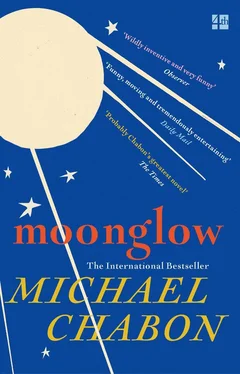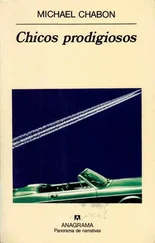My grandfather was troubled and fascinated by this alteration from the girl of ten days before. Had the flirtatious gamine in the Ingrid Bergman sunglasses been a pose adopted for the evening, while this shapely vessel leaking sadness approximated something closer to the truth of her self? Or was it the other way around? Maybe neither version was the “truth.” Maybe “self” was a free variable with no bounded value. Maybe every time you met her, she would be somebody else. He became vaguely aware that he was experiencing pain, a pulsing in his left shin, and realized that his brother was kicking him under the table. Inferring or registering that Mrs. Waxman or Judge Waxman had just asked him a question, my grandfather looked helplessly from one to the other. No help was forthcoming from either direction. Uncle Ray was obliged to intervene.
“Electrical engineering,” he said in a dry tone of voice, sounding exasperated but not unamused. “He has a BS from Drexel Tech. And yes, Judge, he is very much looking for employment, sensitive as he is to the fact that his long-suffering kid brother would dearly love to have his couch back.”
Until very recently, my grandfather, on hearing this remark, would have shot back with something along the lines of Hey, you know what? I can be gone tomorrow , and would have meant it. For weeks he had woken up on Uncle Ray’s couch every morning not knowing why he was still in Baltimore, and lay down on it again every night telling himself it was time to move on.
“I’m interested in rocketry,” he was astonished to hear himself declare. “Inertial guidance systems, telemetry. I’d like to find work out at Glenn Martin, if I could. I hear they might be starting to do some things in that area.”
Mrs. Waxman looked impressed, or maybe she was just taken aback; it was by far my grandfather’s longest utterance of the evening. Judge Waxman said that, as it happened, one of his former law partners had a brother who was a vice president of the Martin Company. Perhaps there was something he could do to help my grandfather.
“Are they building space rockets out there?” Uncle Ray said. During the war, Glenn Martin had built a vast plant at Middle River in the northeastern wastes of Baltimore to manufacture thousands of B-26 Marauders and Mariner seaplanes. “Because let me tell you something, this brother of mine, with his inertia and his telepathy? He might look like a chunk of cement with a flattop. But he wants to fly to the moon.”
Apart from this and my grandmother choking up about the sisters of Carmel, my grandfather had no clear recollection, forty-two years later, of anything else said by anyone at the table that night. The only other conversation he remembered came after dessert and coffee had been served. His feelings about my grandmother at this point were a confusion of curiosity, pity, ambition, desire. He felt that he needed, for the sake of clarity, to escape her gravity for a minute or two, for as long as it would take to smoke a cigarette. He slipped away from the table and, looking for some kind of back stair or terrace, found his way to a large porch enclosed with glass. It was unheated but furnished with wicker and an étagère to hold plants and on a spring afternoon must be a pleasant place to sit and have money and be a judge. It had a closed-up smell. He opened one of the casement windows, hoping to find some purchase in the cold night air.
He had just lit a Pall Mall when the door clanged open. It was my grandmother, cloaked in a thick fur coat, sleeves dangling empty at her sides. The coat, like Mrs. Waxman, came enveloped in a formidable vapor of Tabu. It must have cost the judge as much as the 1947 Cadillac Sixty he had sent around to pick up his guests.
“Hello.”
“Oh, uh, hiya.”
She looked longingly at the cigarette between his lips. He passed it to her and lit another for himself. When he looked up again from the spark and flare of butane, still a little cross-eyed, he saw her shudder once, a traveling wave that passed from her hips to her shoulders and then across her face in a ripple of dismay.
“You okay?”
My grandmother made a funny sound, somewhere between embarrassed laughter and a yelp of pain, then ducked out from under Mrs. Waxman’s coat like it was on fire. At the same time she tossed it in the general direction of my grandfather like she was the burning building and it was up to him, a fireman waiting with his life net, to save it. He caught the coat by the collar. She put a hand to her chest, swallowed, and took a drag on the cigarette. She looked sheepish.
“I’m so sorry,” she said. “Only I really don’t like fur.”
“Oh?”
“When they cut away the skins . . . ? I have seen it.”
“Yeah?”
“And I never liked it.”
That was the first time she told him about the family tannery, in Lille, near the Belgian border. In her schoolgirl English, with almost nothing in the way of expression or emotion, she depicted a childhood haunted by blood and putrefaction and the piss stink of the tanning vats, by horses in the slaughter lot screaming like girls. She described the flaying of hides in terms of vivid color. Silver blade. Red blood. Blue membrane. Golden fat. White bone.
He held the coat up between them. In the moonlit dark of the glassed-in porch, it seemed to shimmer with a ghost of animal motion.
“That is hotter ,” she said.
“Oh, yeah?” He had no idea what she was talking about but felt abruptly that he was back on familiar territory with her, with the girl from “Night in Monte Carlo” telling him how his head would look good on a fence.
“Many hotters. Mrs. Waxman says it takes fifteen or twenty hotters.”
My grandfather could not help it. He laughed. “ Otters ,” he said.
“You know what this is, a hotter?”
“I’m pretty sure that was otter in the soup tonight.”
She frowned, less with her mouth than with her thick Jennifer Jones eyebrows. He liked what her eyebrows did, particularly when she frowned.
“Oh, you are teasing me,” she concluded.
“I’m sorry.”
“No, teasing me is not bad.”
“Really?”
“Yes, when you do it. I like if you do it.”
My grandfather felt himself blush. The only light came from moonglow and a lamp at the far end of the drawing room. He wondered if it was enough for her to see that he was blushing.
“I like you ,” he said.
“I like you, too.” She said it in half a second and then added less than half a second later, “I have a little girl, did you know this?”
“Right,” my grandfather said, caught off guard. So there were two of them, two who would need saving. Essayons . “How old?”
“Four years. Five years in September.”
“And your, uh, the father?”
“I murdered him.” When she saw my grandfather’s face, she burst out laughing, then covered her mouth with her hand. She started to choke on the smoke of her cigarette. “No! I’m sorry . . . !” At first she kept on laughing, but as the coughing fit persisted, it seemed maybe she had started to cry. My grandfather couldn’t tell. She held her breath, let it out. She pulled herself together. “That was a joke but not funny, so why I was laughing?”
That was a tough one to answer. My grandfather let it pass. She stubbed out the cigarette in a pot on the étagère that held dirt and a withered stalk.
“The father is dead,” she said. “In the war.”
She walked over to the casement window my grandfather had opened and put her face through into the cold air. She looked up at the Moon, a day or two past its first quarter. She was convulsed by another shudder, then another. She was definitely crying now, and probably cold as hell. He slung the fur coat over one of the wicker chairs. He took off his blazer. It was the same one he had borrowed from his brother to wear to “Night in Monte Carlo.” He lowered the blazer over her shoulders. She leaned in to it as if it were a stream of hot water from a shower head. She kept on leaning backward until she fell against him. He felt the shock of contact. The weight of her against his chest felt like something she had decided to entrust to him. He wanted badly, wanted only, to be worthy of that trust, although apparently his penis, stirring, had its own ideas on the subject.
Читать дальше












